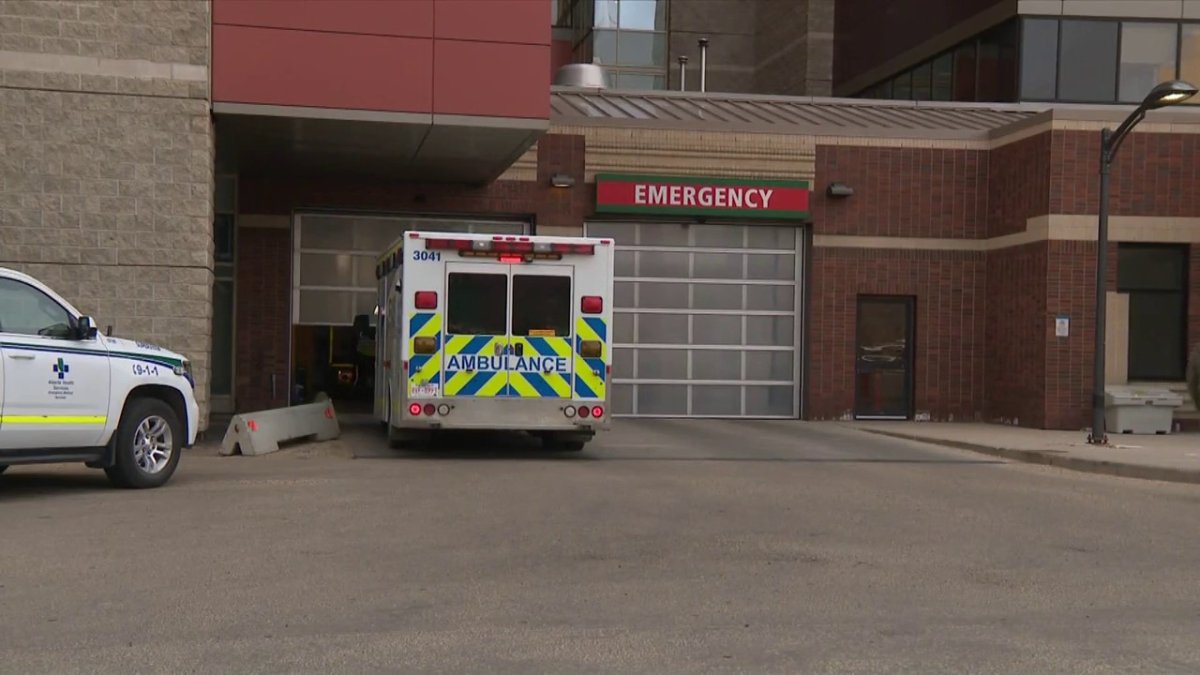Health care experts in Alberta are voicing concerns after Edmonton hospitals were asked to care for patients in hallways as they struggled with patient volume.

On Tuesday, Alberta Health Services directed all Edmonton zone hospitals to take one patient over capacity, forcing health care workers to provide treatment and care in hallways or nonoptimal settings.
The directive was a short-term effort to support emergency department volumes and has since ended, according to an updated statement sent to Global News on Thursday.
But the Health Sciences Association of Alberta (HSAA) says the provincial health authority is making excuses for the dire situation.
“I do not believe that statement because they have done this in the past and we’ve seen this system slowly decay over the last few years,” HSAA president Mike Parker told 770 CHQR.
“They’ve thrown any number of excuses and nobody will admit this because we do not have the capacity. We don’t have the people. We don’t have the health care experts.”

Parker also said this situation is becoming more common across the province and across Canada. Currently, 29 health care facilities in Alberta have reduced their hours or closed because of staffing shortages, including South Calgary Health Centre’s urgent care department.
“We have to realize that our rural health care facilities have been closed, so the only true health care that’s available to the entire province now lies in Calgary and Edmonton,” Parker said.
“Over the last while, we’ve been reporting that our system is failing. We’re beyond that now… This is what our folks are walking into every single day.”
The Alberta NDP slammed the United Conservative Party for the situation, saying it is a result of the government’s fraught relationship with health care providers.
According to deputy leader Sarah Hoffman, hospitals and other health care facilities usually experience a lull in August before the fall and winter when viral illnesses are more common.
“I’m deeply concerned about where we will be in the early fall when respiratory illnesses and other demands on hospitals traditionally increase. We have seen the current disaster approaching for quite some time,” Hoffman said at a news conference on Thursday morning.
“No one in the UCP has acknowledged that the root of the problem is their attacks on health care professionals.”

Steve Buick, press secretary for Alberta’s Ministry of Health, said summer long weekends are “historically often very busy times” and hospitals are already strained by staff absences due to the COVID-19 pandemic.
According to Buick, the AHS are using the same measures they have been using at peak times before the pandemic and they’re intended only for short periods.
“We’re glad to hear from AHS that they’re no longer in effect,” Buick said in a statement.
“The strains are similar in every province and other countries regardless of political stripe.”
More health care staff needed to address issues, says HSAA
- Canadian man dies during Texas Ironman event. His widow wants answers as to why
- ‘Sciatica was gone’: hospital performs robot-assisted spinal surgery in Canadian first
- Canadians more likely to eat food past best-before date. What are the risks?
- Treatment from female doctors leads to lower death rates, study finds
Parker said more permanent full-time staff are needed to address overcapacity issues at Alberta’s hospitals.
“We have a system that doesn’t have the capacity for the volume that we’re seeing, and this is not new. This has been an ongoing issue for many years,” Parker said.
But Parker also said more needs to be done to retain health care workers and keep them in the province.
He is also concerned that more and more people will avoid a career in health care because of how dire the situation is. Parker said schools that train lab technicians, paramedics and respiratory therapists are reporting decreased numbers in recent years.
“When you look at the most recent collective agreement it does not in any way shape or form identify the sacrifices made by those on the front lines, and the response by our members is exiting the industry and finding new careers outside of health care,” Parker said.
“I often see a very explosive exodus statement being made by frontline health care providers… They will no longer be practicing their specific medical expertise.
“You have provided them with a collective agreement that is not sufficient, and yet there is a provincial surplus of billions. All of a sudden, there appear to be massive payouts of bonuses to higher-end executives. It’s devastating.”







Comments